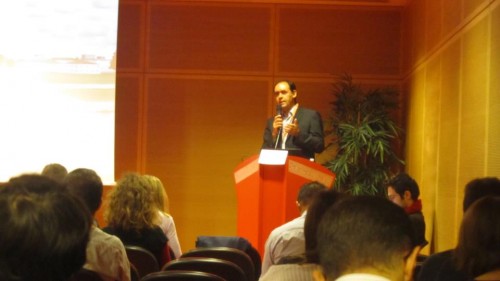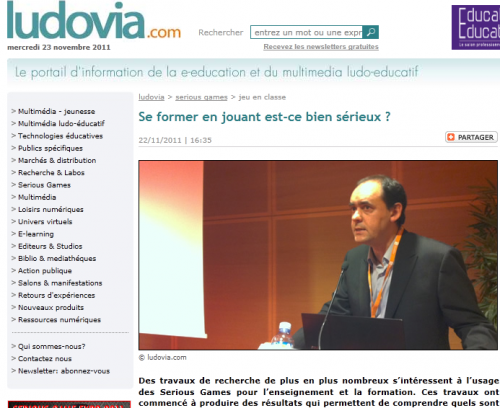19/10/2011
Conférence pour Serious Game Expo
Se former en jouant, est-ce bien sérieux ? 
Des travaux de recherche de plus en plus nombreux s’intéressent à l’usage des Serious Games pour l’enseignement et la formation. Ces travaux ont commencé à produire des résultats qui permettent de comprendre quels sont les modalités d’apprentissage mises en œuvre avec de tels dispositifs. Ainsi, ils fournissent aux concepteurs des guides méthodologiques pour concevoir des jeux utiles et offrent aux formateurs des données sur les éléments à prendre en compte pour intégrer les jeux dans les situations d’apprentissage qu’ils conçoivent.

(photo C. Batier)
Cette conférence permet de faire le point sur les apports de la recherche sur les liens entre jeu et apprentissage.
Cité Internationale - Centre des Congrès de Lyon.
le mardi 22 novembre de 9h45-10h30 - Lieu : Salle 3
17:03 Publié dans Jeux et apprentissage/games and learning | Lien permanent | Commentaires (0)
06/09/2011
A game in the classroom, what do the students learn?

Sanchez, E. (2011). A game in the classroom, what do the students learn? ESERA 2011, Lyon, France.
6th September, Lyon Congress Center Strand 4, 16h30
This paper relates to an empirical study about the use of a serious game for learning how to establish the chronology of geological events. This research involved 45, 16-17 years old students. The students’ challenge consists in reproducing different images of geological cuts with Chronocoupe, a game which simulates the consequences of geological events. The research is based on the Theory of the Didactical Situations (Brousseau, 1986) and recent researches in the field of the uses of serious games for educational purposes (Egenfeldt-Nielsen, 2010). It aims at addressing the following questions: (a) Which elements should be taken into account for the game design in order to permit the learner/gamer to be engaged in epistemic activities? (b) What do the students learn when they succeed in the game?
The digital records of students’ uses of the game permits to draw a behavioral and epistemic models of students (Wenger, 1987). Data sources of the study includes as well the results of a test to assess their capacity to determine the chronology of geological events.
The study show that the design of the software must take into account that the students mostly use a trial and error strategy and that they are reluctant to shift to a strategy based on the analysis of the images to be reproduced. The study also show that the students learn procedural knowledge but they are not aware of the principles that they use when they are asked to establish the chronology of geological events.
07:33 Publié dans Jeux et apprentissage/games and learning | Lien permanent | Commentaires (0)
13/08/2011
Communication à IIGWE2011
 When games meet learning
When games meet learning
Tuesday 16 August 2011 - 2.00pm- 3.00pm full paper session
IIGWE2011 - ICT and Informatics in a Globalized World of Education
Mombasa, Kenya
In a context characterized by a growing gap between youth digital culture and school culture, some have claimed that Game-Based Learning should be considered as an alternative pedagogy adapted to new learners. This paper examines the arguments and objections to using games for educational purposes. Firstly, we state that making a connection between gaming and learning is not an innovative idea, as early researchers demonstrated the potential of games in child development. Secondly, we establish arguments for considering serious games as learning environments (or didactical situations), as opposed to artifacts. Thirdly, in view of the fact that the content of games can be considered as metaphors of real situations, we stipulate that teachers question the relevance of this content. Fourthly, we discuss the main arguments usually emphasized by researchers for considering that games have the power to motivate students. Fifthly, we state that games can be considered as a space of reflexivity where the learner/player is autonomous and develops skills. However, we emphasize the crucial role of the teacher in a Game-Based Learning approach.
23:09 Publié dans Jeux et apprentissage/games and learning | Lien permanent | Commentaires (0)



